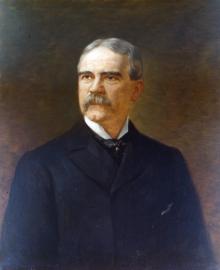- COVID-19 Project
- Home
- Archival Material
- College History Projects
- Subject-Based Digital Projects
- Carlisle Indian School Resources
- LGBT History Project
- Three Mile Island (TMI) Resources
- Civil War Resources
- James Buchanan Resources
- Slavery and Abolition in the U.S.
- Russian and Slavic Resources
- AIFS / AIFS Foundation Collection
- Books of Isaac Norris
- Writings by Dickinsonians
- Digital Images on Flickr
- Dickinson @ Internet Archive
George Edward Reed (1846-1930)

George Reed was born in Brownsville, Maine on March 28, 1846 as the tenth of eleven children of the Reverend George and Ann Hellyer Reed. His father died when George was 10 and after living with relatives he was reunited with his mother in Lowell, Massachusetts at the age of 10. He went to public schools in Lowell and worked farm jobs in the summers, including the memorable Civil War year of 1864 when he worked for some time at a "contraband camp" in New Bern, North Carolina, where 10,000 former slaves were sheltered.
He prepared for college at Wilbraham Academy in Massachusetts and went on to study at Wesleyan University from which he graduated with honors in 1869. Reed had funded some of his time at Wesleyan by preaching every Sunday, and, although he had been intending a career in the law, a year of theology at Boston University set him on the path of the Methodist ministry. He served his first pastorate in Willimantic, Connecticut, and went on to a series of posts in Massachusetts, New York, and Connecticut over a span of nearly twenty years. In 1885, Reed received an honorary doctorate of systematic theology from Wesleyan University and a doctorate of laws from Lafayette College in 1889.
On June 26, 1889, Reed was inaugurated as the fifteenth president of Dickinson College in Carlisle, Pennsylvania, a position he would hold for the next twenty-two years. With little experience of academic affairs and none with the College, he nonetheless dedicated his tenure to improvement and expansion. He began with the removal of the piles of litter and rubble which had defaced the campus for some time. With the conviction that Dickinson could be a fine university -- a notion which not all of the faculty or all of the Board shared -- Reed worked with Dean William Trickett in 1890 to re-establish the Dickinson School of Law, with Reed acting as president. He oversaw the tripling of the enrollment of the College and a significant increase in the size of the faculty. The College campus was similarly expanded. He worked with Edward Biddle in order to construct Biddle Athletic Field in honor of Biddle’s son. Denny Hall was built in 1896, only to be destroyed by a fire in 1904 and reconstructed in 1905, in an impressive feat of financing. Conway Hall was also erected under Reed's supervision in 1902 and the steam plant, which would heat all Dickinson College buildings for decades through a series of tunnels, was completed. He also purchased the home of Judge John Reed, renovated it, and donated it to the College as the home of the president of Dickinson. These accomplishments and the length of his tenure led to the nickname "The Grand Old Man."
However, when Reed retired from the presidency in 1911, this expansion had left the institution in some financial difficulty that would become a problem for the succeeding president, Reverend Eugene Noble, and which would mark the early years of James Henry Morgan's presidency as ones of careful consolidation. After his retirement, Reed moved to nearby Harrisburg with his wife, Ella Frances Leffingwell Reed, whom he had met and married during his first pastoral post in Connecticut in 1870. This enabled them to be closer to the home of their only child, George L. Reed, a lawyer who was then serving in the Pennsylvania State Legislature. He spent the following years preaching in Harrisburg and Delaware and teaching a large Bible class in the African-American section of the Y.M.C.A. in the city. Ella Reed passed away in August 1922, and George Reed died in the Polyclinic Hospital in Harrisburg on February 7, 1930 at the age of 83. He is buried in the Old Graveyard in Carlisle.
Date of Post:
2005
Faculty - Years of Service:
1889-1911
President - Years of Service:
1889-1911